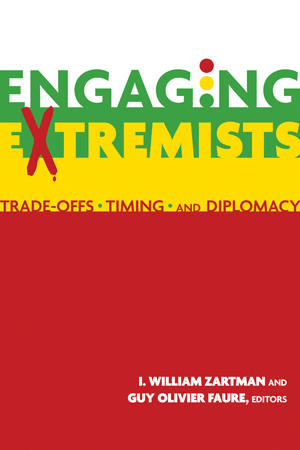Engaging Extremists concerns negotiation with political terrorist organizations, separating terrorist groups that can be engaged from those that, for the moment, cannot.
"Engaging Extremists is a fine scholarly study on an important issue of our time. This well-written volume examines negotiation and engagement between states and terrorist organizations, and underscores well the difficulties of mediation in cases of insurgency."
—Bruce O. Riedel, senior fellow in the Saban Center of the Brookings Institution.
For many, negotiating with terrorists amounts to capitulation that only encourages more terrorism. The editors of this book, by contrast, argue that engaging extremists is an indispensable part of a broad policy that is complex in its tactics and deliberate in its balance. While recognizing that engagement carries many risks, they contend that it is not the act of negotiation that encourages or discourages terrorism; it is the terms of the negotiated agreement. The point is not whether to negotiate but how to negotiate creatively to moderate terrorist means.
Engaging Extremists concerns negotiation with political terrorist organizations, separating terrorist groups that can be engaged from those that, for the moment, cannot. Dealing with terrorism includes keeping violent means in check, transforming its ends from destruction to participation, and undercutting the grievances on which it is based. The essays in this volume tackle the questions of “when” and “how” with a mixture of conceptual discussions illustrated by case analyses. By approaching terrorism as a phase in conflict by ethnic, religious, ideological, and other groups, the first half of this volume identifies appropriate times and tactics for taking advantage of the terrorist organization’s life cycle from when it begins, matures, and declines. The latter half focuses more specifically on the “how” by studying successful experiments in engaging future and past terrorists, the role of third-party mediators, and two case studies of failed negotiations with terrorists.
In the face of terrorism and militant extremism, states must strike a delicate balance between isolation and engagement. Engaging Extremists provides valuable insight into when and how such engagement might be pursued.
I. William Zartman is the Jacob Blaustein professor of international organization and conflict resolution and director of the African Studies and Conflict Management programs at the Johns Hopkins University's Paul H. Nitze School of Advanced International Studies in Washington, D.C.
Guy Olivier Faure is professor of sociology at the Sorbonne University, Paris V, and a member of the Steering Committee of the Processes of International Negotiation (PIN) Program. He also engages in consulting and training activities with enterprises, multinational companies, governments, and international organizations.
